Transcription
What Constitutes A Punishable Offense?
What a person can be punished for plays a major role in how they are conditioned. Most of our civilized behavior--if not all of it--is learned by the process of punishment and reward. As a child, I would be spanked if I did something that was contrary to the rules of my parents. Depending on the offense, I could lose privileges, or be "sanctioned" for my behavior. If my behavior was in line with my parents' rules, I would receive a reward, or some kind of positive reinforcement. My parents were conditioning me--through the process of reward and punishment--to become--what they had hoped would be--a productive citizen. Prisons use this same process, however one must be mindful that "what" you can be punished for, plays a tremendous role in "how" you will be conditioned to behave. So, what can a prisoner be punished for?
Did you know that I could be punished for hand washing my clothes? It is a punishable offense. If it is a hot summer day, and I decide to go outside and play basketball, and my clothing becomes drenched in dirt and sweat, once I return to my cell. I am not allowed to wash those clothes. My sweat-soaked shorts, tee-shirt, underwear, and socks are supposed to sit in the corner of my cell and ferment for a week. Yes, it is true, we are not allowed to wash our laundry. The DOC will tell society that they provide us with a laundry service, however, we are only allowed to send laundry out to be washed once per week! The way in which our laundry service works is: on Wednesday night, I can put in whatever laundry I need to be washed (well, a maximum of two laundry bags). That laundry goes out on Thursday morning, and is returned to us on Thursday afternoon. That's it. No more laundry until the next Wednesday night. So if I get my laundry back on Thursday, and I go out to play basketball ... What's more troubling, is that when you come into the system, you are only provided with two sets of clothing (2 underwear, 2 pairs of socks, 2 t-shirts, 2 pairs of scrubs), and if you do not have money to buy more, you are stuck with only two sets of clothing that you are unable to wash for a week. To add to that, we are only allowed to have two bath towels, that we are not allowed to wash for a week. Nasty doesn't cover it.
Did you know that I could be punished for sharing? Yes, rehabilitation is something else. Sharing is a punishable offense. They SURVIVE off of whatever scraps the state tosses them. If I am more fortunate, where I am financially sound, and I see a poor man who is in need of sneakers, I can be punished if I buy him a pair. If I cook a big meal, and I give a hungry man a bowl of food to eat, I can be punished. If I allow a friend to borrow my radio or headphones, I can be punished. Sharing is prohibited. Unfortunately, so is helping.
Did you know that I could be punished if I helped another prisoner, in an emergency situation? Staff, I'm not so certain about, but if I saved another prisoner's life, I could be punished. If a prisoner fell unconscious and needed CPR, I can be punished if I provide it. Helping out in an emergency is a punishable offense. If a person is bleeding out and I save him, I can be punished.
Though there are several other ridiculous things that constitute punishable offenses, the above are the three biggest components of negative conditioning in the DOC. For example, when a person spends 10 or 20 years under these kinds of rules, they are being conditioned to behave a certain way. If, after serving such amount of time, a person is sent home, they are conditioned to not be so clean, because it was against the rules for twenty years, to wash their clothes. The person would also be conditioned to not share. If I see a hungry person on the streets, I cannot give him or her food, because it was against the rules. If there were a car crash or other emergency that required immediate intervention, the prison-conditioned person would have to keep walking, because getting involved was against the rules for twenty years. Where is the rehabilitation in this? How is conditioning people to not clean their clothing, share, or assist in emergencies, beneficial to public safety, and how does such conditioning serve to promote positive behavior? if a system is designed to do a certain thing, e.g., rehabilitate, and a person spends twenty years in that system and is not rehabilitated, the problem is not the person, but the system. Something doesn't work. If I were addicted to drugs, something is wrong with the program. The treatment strategy doesn't work.
Another troubling punishable offense is kissing your spouse during a contact visit. In other words, showing affection for your spouse is punishable. If I touch her leg, or if she lays her head on my shoulder, I could be punished. Keep in mind that these are contact visits. Several men who have visits leave their visits upset because a security officer approached them in some way, and dictated how they could interact with their wife or children. It is highly unproductive for a guard to tell a man how to interact with his wife, especially in front of the wife. It's demeaning, and it minimizes the male role in front of the child. It is very hard to keep a girlfriend or spouse while incarcerated, because the rules creates strain on the relationships. The interesting thing is that the DOC tells society that they promote family bonding, but how can this be if they are not allowed to bond? The conditioning in this case, causes the incarcerated person to go home with a disconnect from his or her family. After so many years, men in prison don't know how to interact with women, because we are not allowed to show affection. In addition to not being allowed to show affection during our visits, we can also be punished for looking at female staff. Yes, if I look at a female staff person for too many seconds, I can be punished for "reckless eyeballing/" That's a real charge. If you appear to have too much conversation with one of the female staff, you and her can be punished for fraternizing. So we are not really allowed to deal with women, which after 10 to 20 years can have a major effect on how you socialize with women once released.
Some other minor things that we can be punished for includes: having more than ten books to read (if I have ten books in my cell, I'm OK, but if I have eleven, I can be punished); saving state food (we eat in our housing units, and we have individual refrigerator boxes to store food. If I do not have money to purchase food through the canteen, I may want to save one of my state meals, so that I can have something to eat before I go to bed. If I take my state hamburger and store it in my refrigerator box for later, I can be punished. We are allowed to buy hamburger through the canteen, and can store that. And lastly, for the sake of not writing a book, I can be punished for having too much of my own legal material in my cell. If I am working on my case so that I may go home, I am not allowed to have all of my case material in my cell if it exceeds 1 cubic foot. I can be punished for having more than that. There are many other things that are punishable, and they are usually at the whim of the staff. They can really punish us for anything. I would be remiss if I didn't mention that sunbathing is a punishable offense. Yes, lying out in the sun, where we don't have trees in the yard anyway to shade us, is punishable.
The point of all of this is to educate society about some of the things that goes on behind the walls of prisons, and the counterproductive nature of them. We alone do not have the power to change any of these ridiculous rules. The DOC does not care about prisoners' issues, unless they are being talked about in the free world. We need a intervention from the public, and I refuse to believe that nobody simply cares. I believe strongly that people don't know, and if my theory proves true, we should be able to at least start a conversation.
Punishable Offenses:
* Having more than 10 pencils or ink pens
* Having a family photo on top of my T.V.
* Having anything in my cell windowsill (book, bowl, fan, etc.)
* Having empty soda bottles (we buy soda via the canteen, however, once the bottle is empty, is is contraband).
* Possessing, storing food, or eating out of an empty sherbet bowl (we buy sherbet via the canteen. Once we eat the sherbet, the bowl becomes contraband. If I am too poor to afford a bowl sold through property, and a man gives me an empty sherbet bowl so that I can have something to eat in, he could be punished for giving me contraband, and I could be punished for possessing it.)
* Sleeping under the covers after 8:30 AM (if I decide to sleep in for the morning, I could be punished if I am under the covers. Even in the winter when the heat is not working (which happens often)).
* Sharing the phone (we are not allowed to let anyone speak to our friends and family over the phone. So when Brother Jabir does the interviews, we are all at risk of being punished).
There are still many petty infractions that we can be punished for, but I thought these were worth mentioning in order to show the pettiness of the system. They want to control every single aspect of our lives. Some prisoners leave with a lot of hate in their hearts, and society usually just says, "Well, he or she is just a bad person," but not that's not necessarily the case. You must start asking, "Why is there so much venom in his/her heart?" If you lived a life where almost everything that you do is punishable, would you love the system, or the people who advocate for it?
Other posts by this author
|
2017 jun 24

|
2017 jun 24
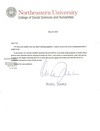
|
2017 jun 24
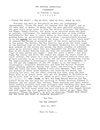
|
2017 jun 24
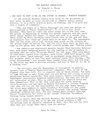
|
2017 jun 18
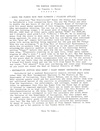
|
2017 jun 15
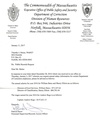
|
More... |

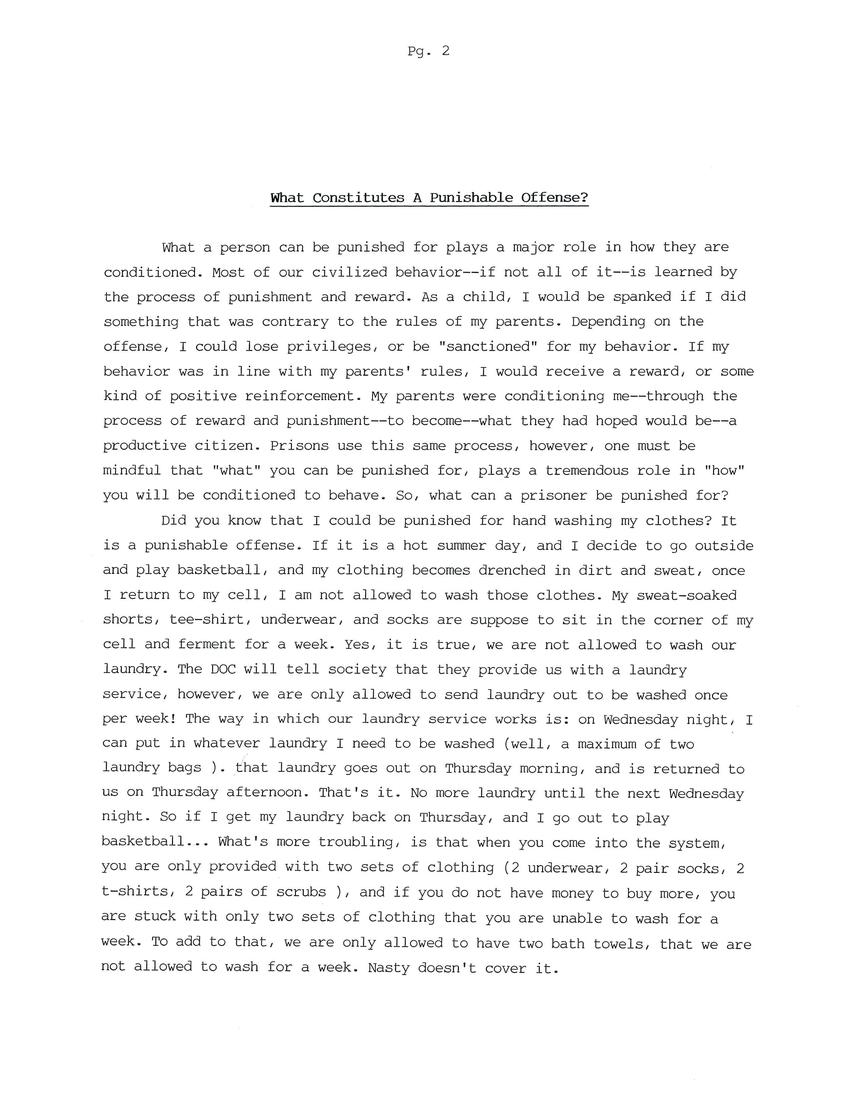
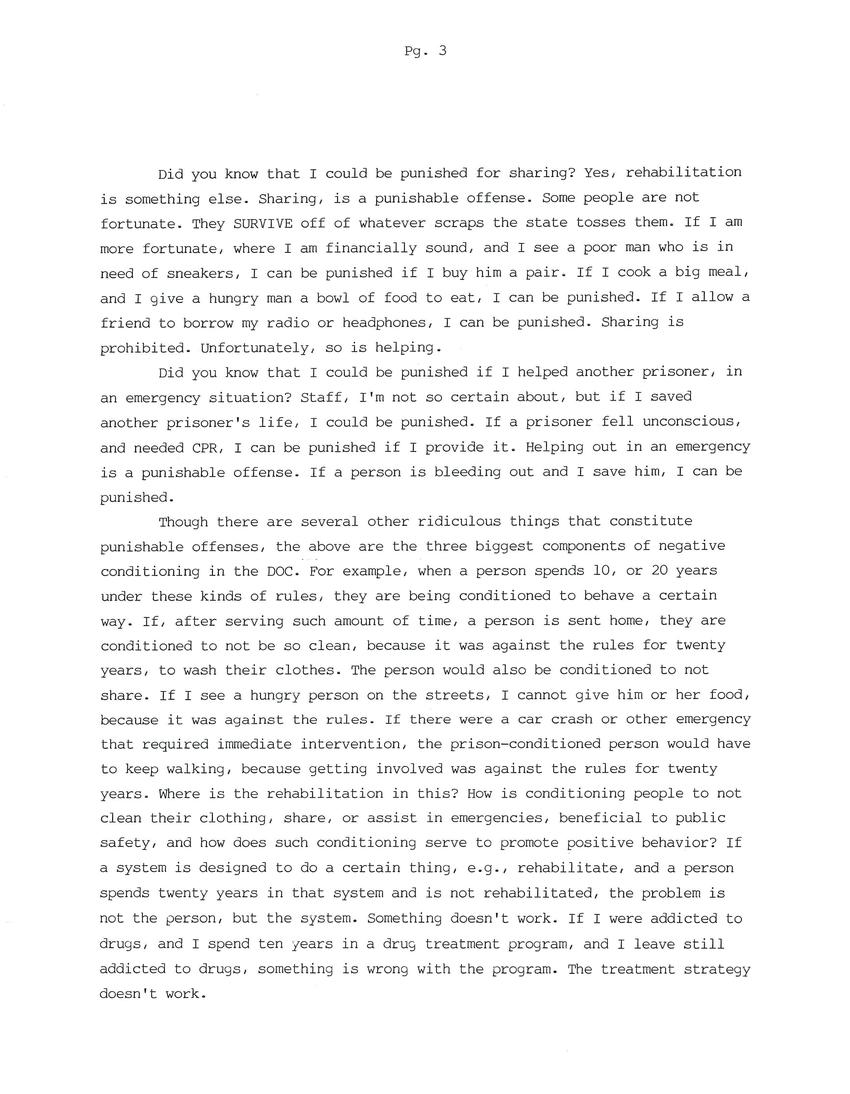
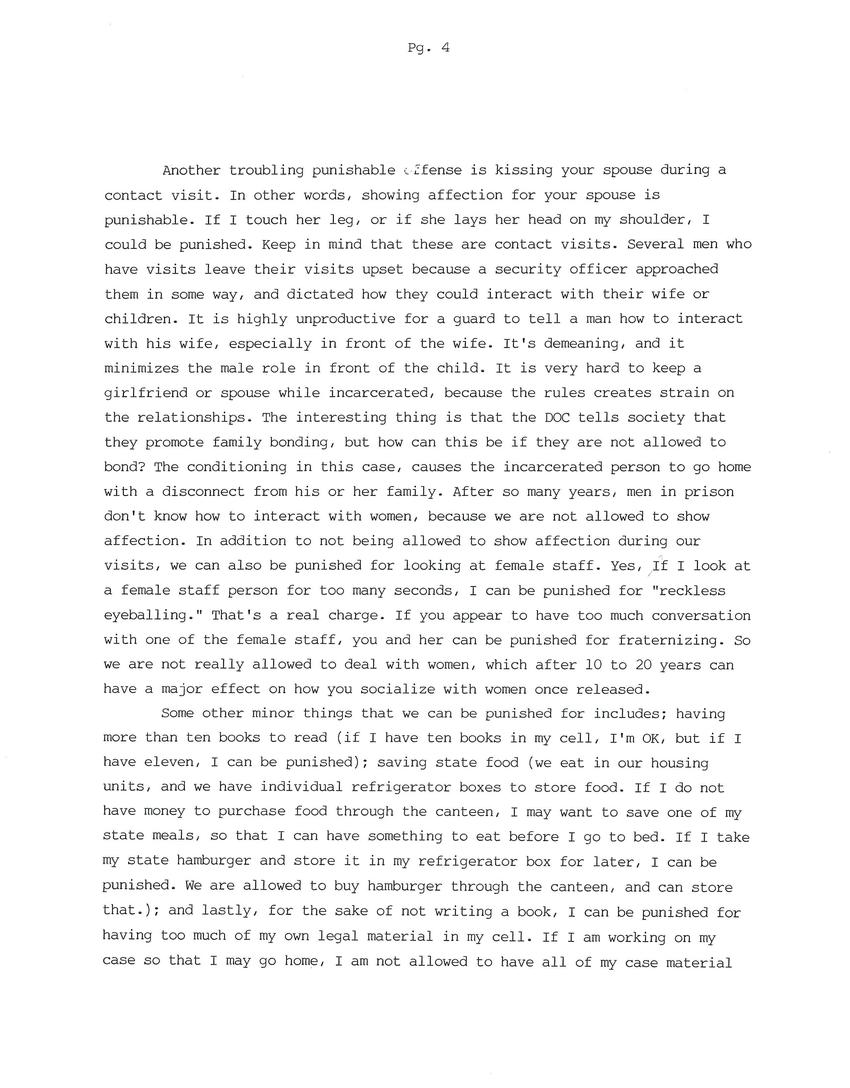
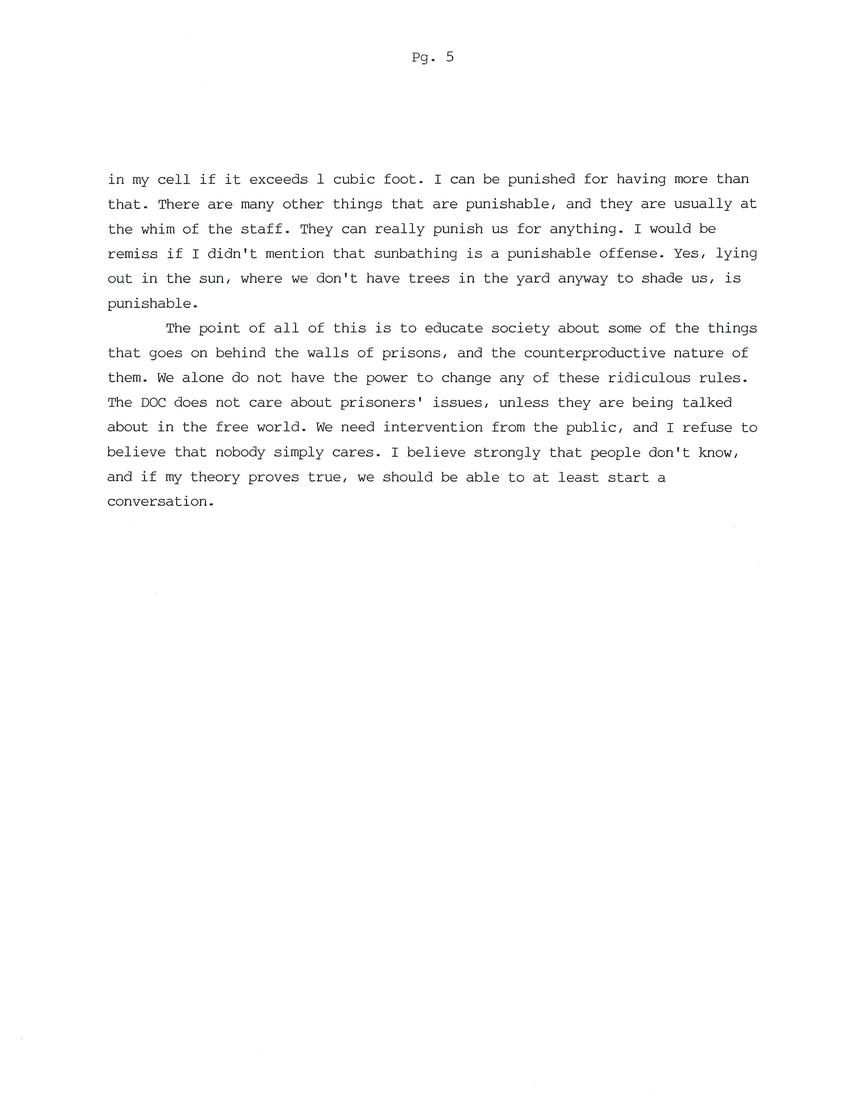
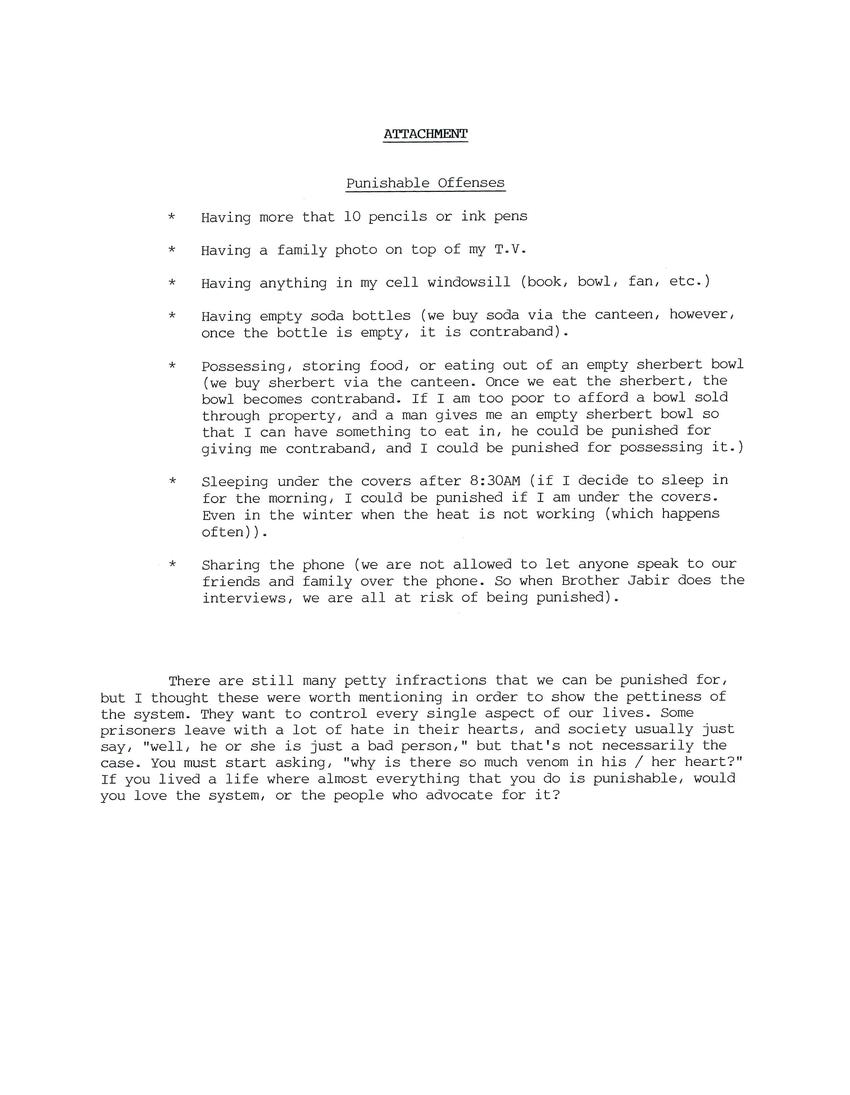

Replies (4)
Gypsy